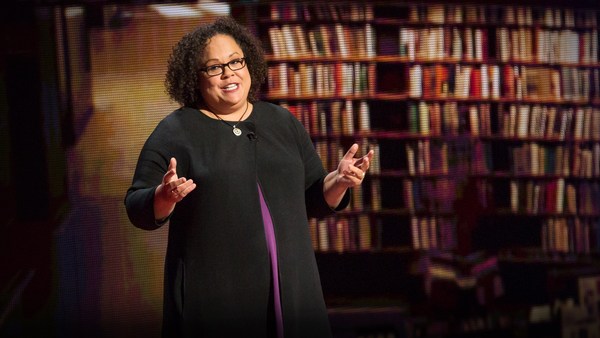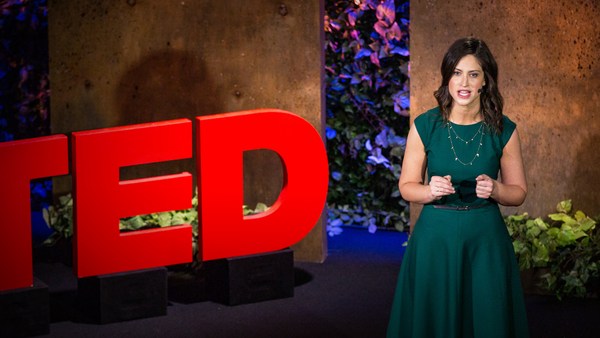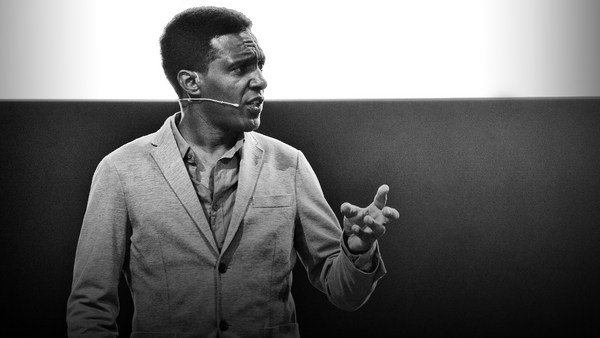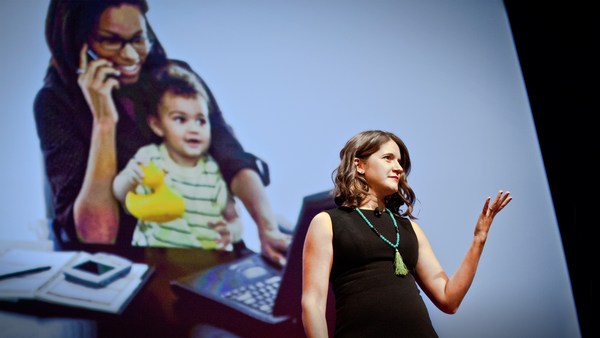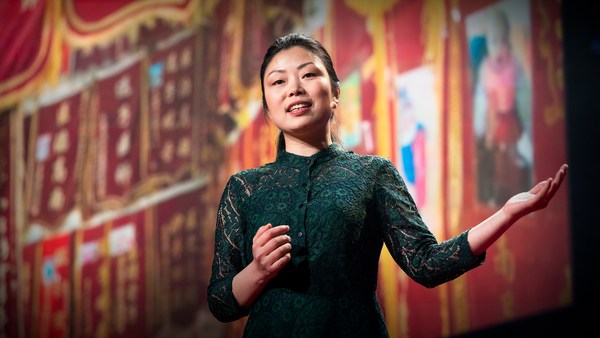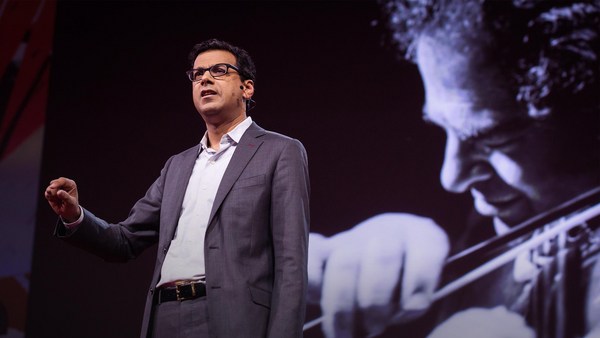I'm an exhausted dad. Currently owned and dominated by two mini dictators, who rule my life with an iron fist while wearing their Huggies diapers.
(Laughter)
Now probably because I've been drowning in small people lately, I've been paying close attention to a particular headline. It seems around the world, in developed countries, people are having fewer babies. From North America to Europe to China to Japan, there's actually been a consistent decline in birth rates. In fact, over the past 50 years, the global fertility rate has halved.
What the heck is going on? Now, my friends who don't want kids, all point to climate change as a reason for never having babies. And many of you are sitting there right now, saying, "Waj, there's also overpopulation, there's also high birth rates, which still exist in many African and Middle Eastern countries, there's also orphan kids who still need parents, there's also a lack of resources to go around for everyone, and oh, by the way, we have a ginormous carbon footprint that is destroying this planet.
I hear you, I hear you. And yet, despite all this chaos, I still think we should have babies. I believe we can and should fight for the earth and humanity, side by side.
Now, if I could take it personal for a second, I get it, I get why some of you might be skeptical about having babies. Here's a photo of my wife and me before we had kids. Young, happy, fresh.
(Laughter)
Here's a photo of me after having kids. A broken, defeated husk of a man.
(Laughter)
Here's the photo of the car I thought I'd be driving as an adult. A Porsche. Here's what I actually drive. A Honda Odyssey minivan.
(Laughter)
(Applause)
For the minivan. Where there was once hope, now there is convenient space, and good mileage, good mileage.
Now, I just want to stress that I'm completely aware of the very dire threats of global warming and climate change. I just want to acknowledge that choosing to have babies is a deeply, profoundly personal choice. And that many who want to are unable. But just for today, let's examine the flip side of the coin. At how not having enough new people is going to be a major problem moving forward.
According to the World Health Organization, we need to average about 2.1 children per woman today just so we have enough people to replace the previous generation. A lot of you thought overpopulation was going to be a problem in 100 years -- yeah, it might be underpopulation. So a question: what happens if that number dips below 2.1? There's going to be a domino effect. As all of us get older, and live longer, there's going to be a shrinking younger population, which is going to lead to rising labor shortages in the world's biggest economies. I'm talking about United States, China, Japan, Germany. Fewer younger working people means less tax revenue. Less tax revenue means less money and resources to go to safety net programs that all of us are going to depend upon. I'm talking about pensions and health care. It seems every generation is indeed connected.
But how the heck did we get here in the first place? Well, in some cases, it was intentional. Let's take the DeLorean to simpler times. Let's stop in China. Somewhere between the death of disco and "Empire Strikes Back" -- 1980. In 1980, China decided to implement the one-child policy, largely limiting most parents to having just one kid to combat overpopulation. Check out some good old-fashioned Chinese propaganda, lovely.
Now, fast-forward to 2019. Even after ending its one-child policy in 2015, China's birth rates have largely declined. In fact, the falling population in China is removing one of its biggest drivers of growth -- people. If trends continue, China's population is actually going to peak in 2029, before entering "unstoppable decline." China's government is so freaked out right now that it's actually doing new propaganda -- it's begging couples to have children for the country.
Let's take the DeLorean and hop over to Japan, home of my beloved Honda Odyssey minivan.
(Laughter)
Japan is now producing more adult diapers than infant ones. The number of kids in Japan has fallen for the 37th straight year. And unlike other countries, it has not been able to replace its population numbers through immigrant workers. There will be labor shortages and not enough money to fund the safety-net programs. Now, Japan has introduced two solutions. First, a financial incentive. Some local governments in Japan have offered couples money to have babies, with the money increasing with each additional child being born. This actually worked for one year in 2014 in this town called Ama. It actually raised the birth rate from about 1.66 kids per woman to 1.8. But it did not gain traction across Japan.
In 2018, a leader of Japan's ruling party tried a new tack. He told young people, "You're selfish for not having babies." Shockingly, shaming was not a rousing aphrodisiac. Surprise, I know, surprise. Who would have thought?
(Laughter)
Let's take the DeLorean to Europe, the continent of delicious cheeses I love to eat but cannot pronounce. The UK and much of Western Europe has a birth rate of about 1.7 kids per woman, which at least is better than Hungary, where it hovers around 1.45. Now, Hungary's prime minister Viktor Orbán has proposed a new solution to try to incentivize people to have kids. He said families where the women have four or more kids will no longer pay income tax. Pretty good, right, pretty good. At least it's better than Russia's 2007 proposal, which once offered women in a particular region the opportunity of winning a fridge if they had more kids.
(Laughter)
Yeah, it didn't work, it didn't work. But hold on, pump the brakes. Orbán is primarily proposing this because he wants to limit the population of Muslims and people of color. He says he doesn't think Hungary's traditions and culture and color has to be "mixed with those of others." Subtle. Unfortunately for Orbán, and much of the EU, the birth rates are not high enough right now to be replenished without immigration. Among EU countries, there is a demographic decline. So it seems, in Europe, karma is going to be brown and Muslim.
(Laughter) (Applause)
Just saying.
The question remains: Why aren't people having enough kids? Why is the birth rate declining in these countries? In some cases, it's because women are more literate, more educated. They have more economic opportunities -- applaud. All good things, all good things, yes.
(Applause)
In India, this has been fantastic, it has actually reduced the birth rate but kept it above that magic 2.1 number. Women also have more access to birth control, more control over their reproductive lives, all good things. But in the United States, in particular, a lot of young people are opting out of having kids, largely cite the same reason: financial concerns.
Let's take the DeLorean to my motherland, the United States of America, where the birth rate hit its historic low in 2017. The United States is the most expensive country in the world to give birth. If you do not have insurance, it will cost you 32,000 dollars to have a baby, if everything goes perfectly. That's like buying a brand new Honda Odyssey minivan, OK? So, congratulations, you just had a baby, but the baby's economic productivity is zero, and guess what? The United States is the only industrialized country in the world that does not require employers to offer paid parental leave. "Mom, you just had a baby, congratulations, that's lovely. Get back to work or you're fired, young mom!" My wife and I, both working parents, pay about 3,500 dollars a month -- a month -- in Virginia for childcare. If you do the math, that's 40,000 dollars a year. That's like buying a brand new, souped-up, Honda Odyssey minivan, OK. I have one, I do not need 10.
So here's my bold suggestion. Let's make it easier for people to have babies. It seems in order to invest in our future, we actually have to invest in the present and help those people who want to become parents. Give them affordable health care, give them affordable childcare, give them paid parental leave. Among the EU states in 2017, France reported the highest birth rates. Why? Largely due to its pronatal policies that actually kept women in the workforce. I'm talking about subsidized daycare and paid maternal leave. China and Japan, thank God, are finally wisening up and proposing such policies. This is great.
That being said, I know some of you have listened to me and you still think the best investment we can make in the future is not having babies. I respect that. I get where you're coming from. And I know many of you in this audience want to have babies but you are terrified about the future. And as a parent, I feel you. I'm scared about the future.
I wrote that last line a month ago. But it really hit home three days ago for me, while I was at TED. Three days ago, my wife calls me, crying. I pick it up in my hotel room. And she said, "I'm calling from the hospital." We had to take my baby daughter Nusayba, who was named after a warrior princess, to the hospital, because she found a bump on the stomach. We got back the results, and there were bumps all around her liver. Today, this morning, we found out that she has stage IV liver cancer.
(Audience gasps)
It has been a challenging week. It has been a challenging week. And if I may, I just want to take a moment to acknowledge the TED staff, everyone, top-down, everyone in the back, in the green room, some of the speakers, word has spread. On behalf of my family, my wife, and my parents -- my Pakistani parents said I had to say this -- thank you for just being decent and kind this week. So thank you.
(Applause)
These are my beloveds, my Ibrahim and Nusayba, my babies. I talked to my wife, and despite the terrible news and the fight ahead, we both concluded that we regret nothing. Deciding to have babies was the best decision we ever made. Our babies have brought us so much joy and they've brought the world so much joy, and having kids is a risk, but life is a risk. And yes, I hope you've been paying attention, we need to invest in babies in developed countries if we want to help save our economy and pensions. But that's not the reason you have babies. That's not the main reason. Babies have always represented humanity's best, boldest, most beautiful infinite possibilities.
And if we in developed countries, as a whole, opt out, and don't invest in present and future generations, then what the hell's the point? What's the point of being on this absurd journey together? And so, for those who can and who choose to, for those who can and who choose to have kids, may you pass on this beautiful thing called life, with kindness, generosity, decency and love.
Thank you.
(Applause)
